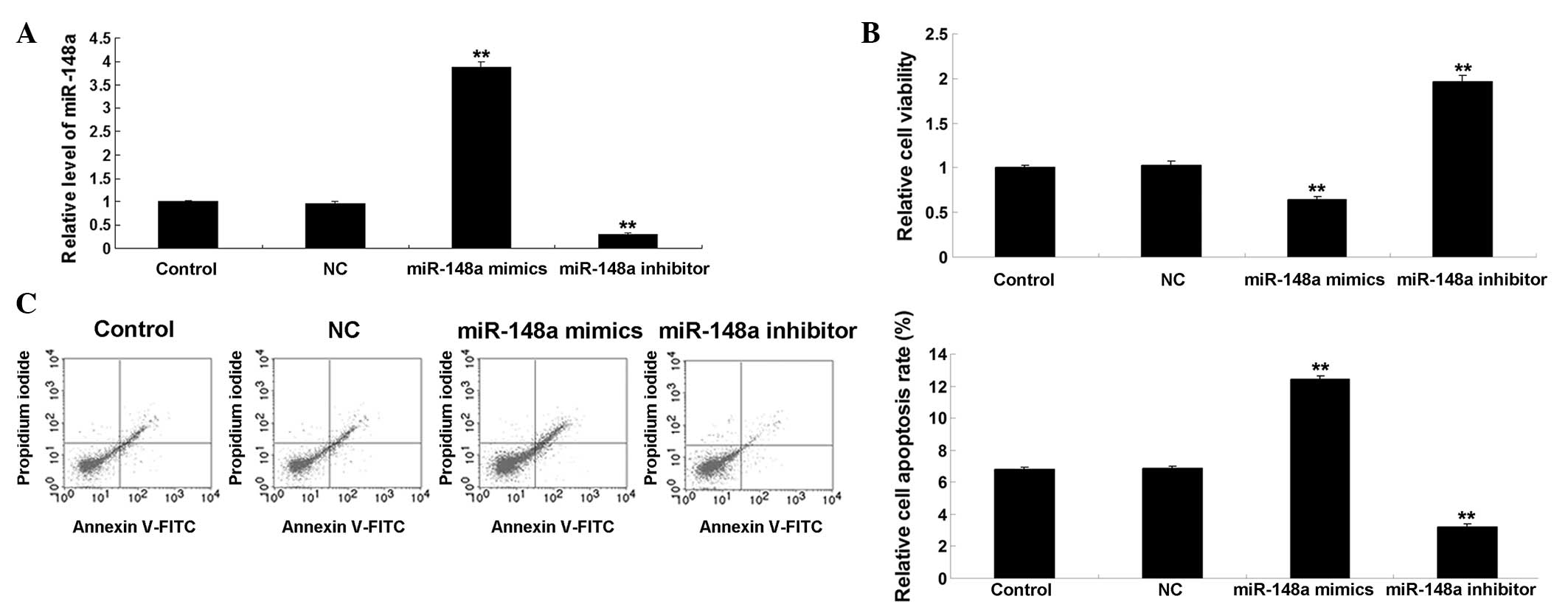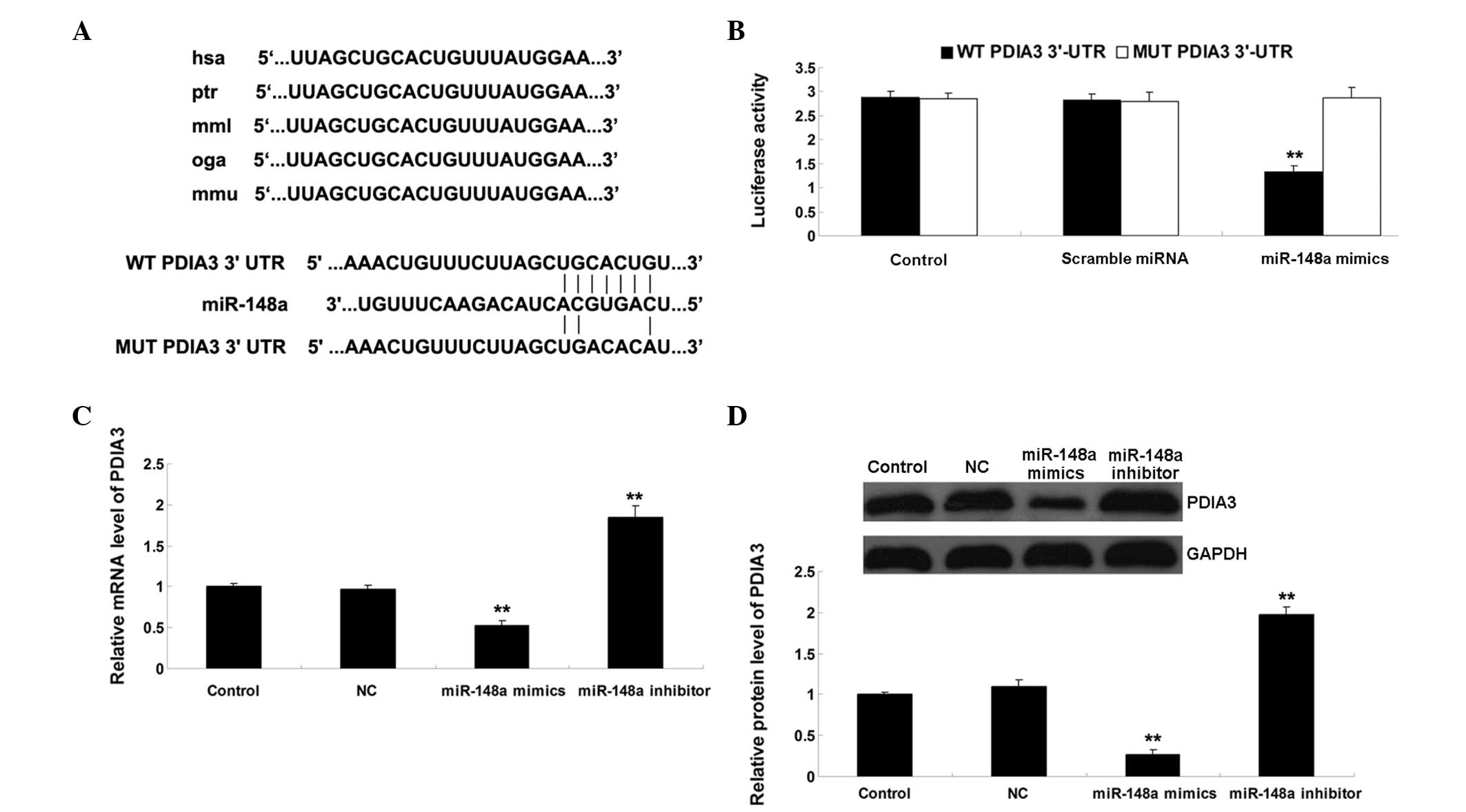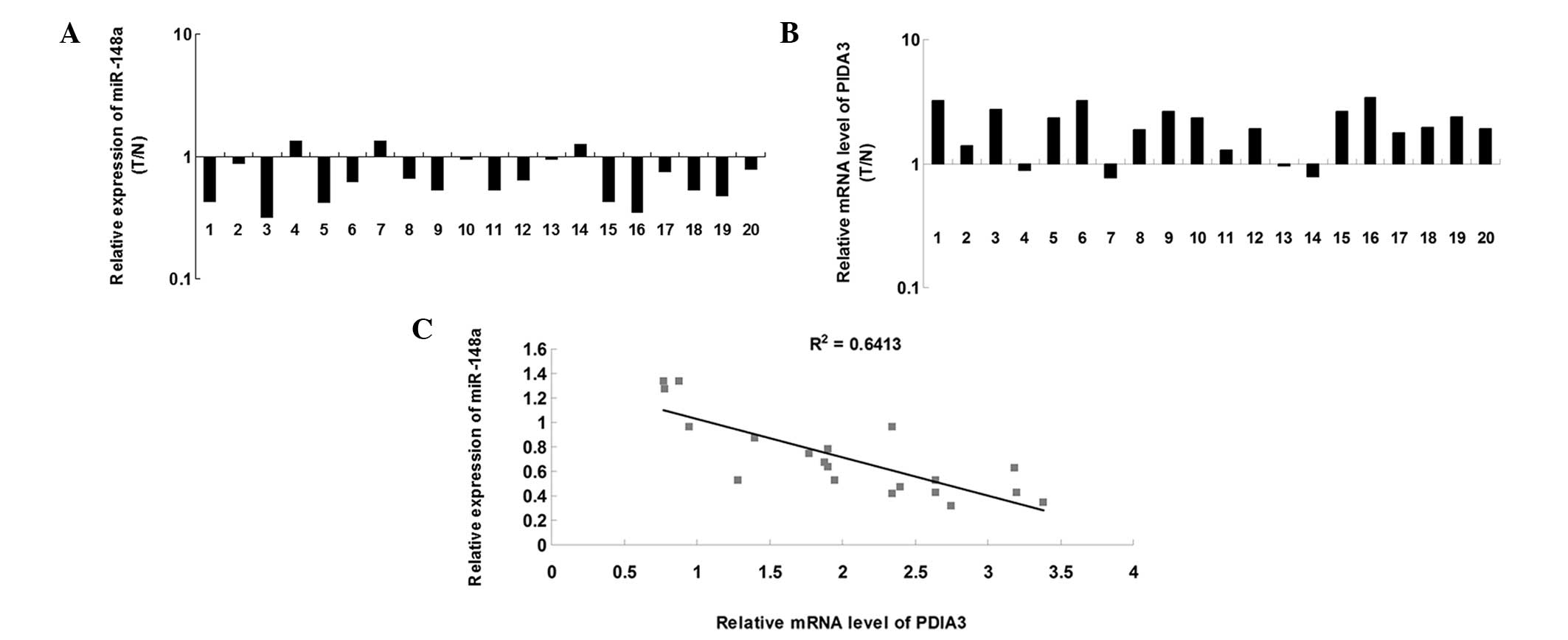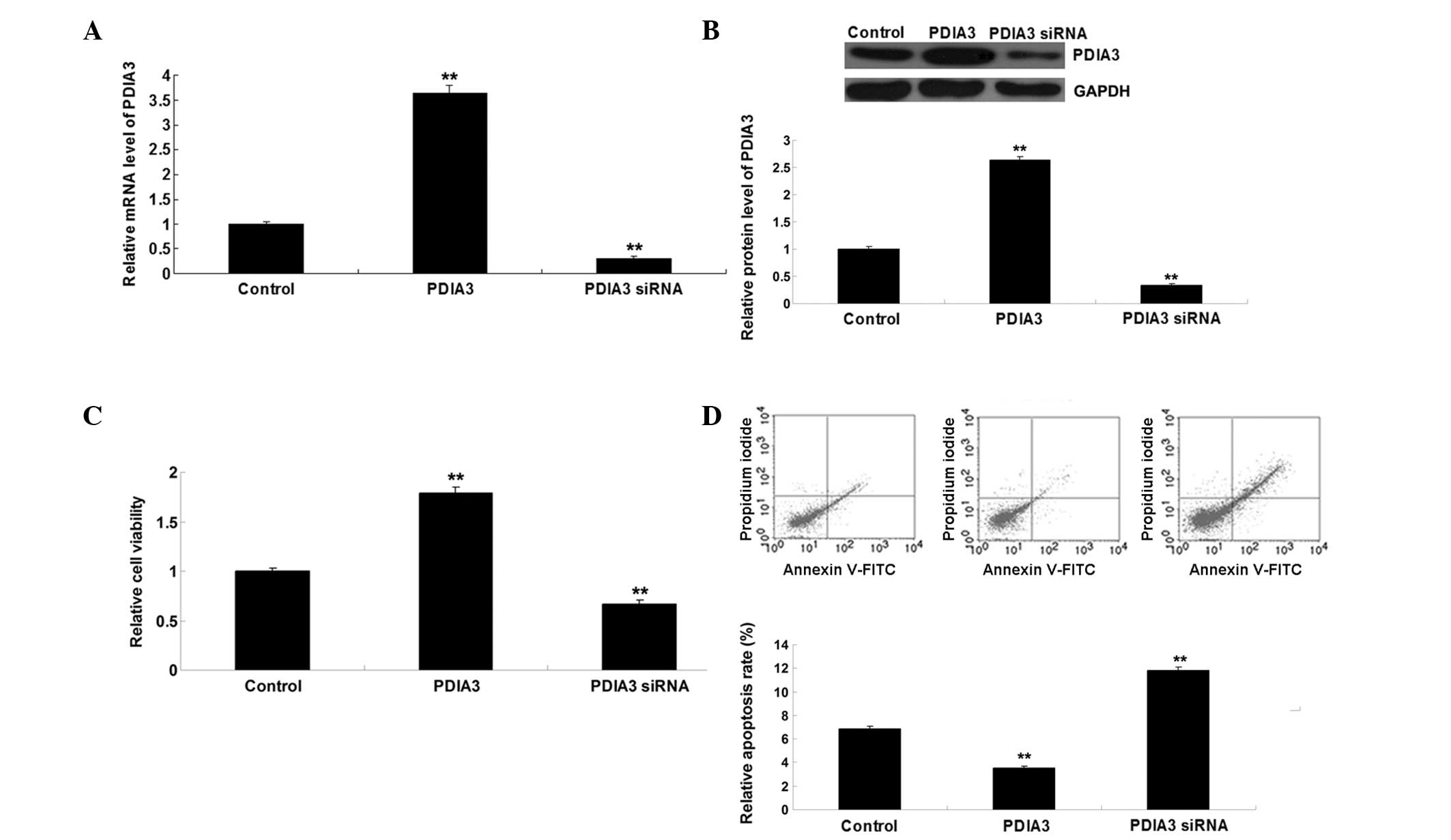|
1
|
Choi JH, Wong AS, Huang HF and Leung PC:
Gonadotropins and ovarian cancer. Endocr Rev. 28:440–461. 2007.
View Article : Google Scholar : PubMed/NCBI
|
|
2
|
Shylasree TS, Bryant A and Athavale R:
Chemotherapy and/or radiotherapy in combination with surgery for
ovarian carcinosarcoma. Cochrane Database Syst Rev.
2:CD0062462013.PubMed/NCBI
|
|
3
|
Llauradó M, Majem B, Altadill T, et al:
MicroRNAs as prognostic markers in ovarian cancer. Mol Cell
Endocrinol. 390:73–84. 2014. View Article : Google Scholar : PubMed/NCBI
|
|
4
|
Park SH, Song JY, Kim YK, et al: Fascin1
expression in high-grade serous ovarian carcinoma is a prognostic
marker and knockdown of fascin1 suppresses the proliferation of
ovarian cancer cells. Int J Oncol. 44:637–646. 2014.PubMed/NCBI
|
|
5
|
Ambros V: The functions of animal
microRNAs. Nature. 431:350–355. 2004. View Article : Google Scholar : PubMed/NCBI
|
|
6
|
Bartel DP: MicroRNAs: Genomics,
biogenesis, mechanism and function. Cell. 116:281–297. 2004.
View Article : Google Scholar : PubMed/NCBI
|
|
7
|
Bienertova-Vasku J, Sana J and Slaby O:
The role of microRNAs in mitochondria in cancer. Cancer Lett.
336:1–7. 2013. View Article : Google Scholar : PubMed/NCBI
|
|
8
|
Li J, Song Y, Wang Y, Luo J and Yu W:
MicroRNA-148a suppresses epithelial-to-mesenchymal transition by
targeting ROCK1 in non-small cell lung cancer cells. Mol Cell
Biochem. 380:277–282. 2013. View Article : Google Scholar : PubMed/NCBI
|
|
9
|
Heo MJ, Kim YM, Koo JH, et al:
microRNA-148a dysregulation discriminates poor prognosis of
hepatocellular carcinoma in association with USP4 overexpression.
Oncotarget. 5:2792–2806. 2014.PubMed/NCBI
|
|
10
|
Zheng B, Liang L, Wang C, et al:
MicroRNA-148a suppresses tumor cell invasion and metastasis by
downregulating ROCK1 in gastric cancer. Clin Cancer Res.
17:7574–7583. 2011. View Article : Google Scholar : PubMed/NCBI
|
|
11
|
Zhang JP, Zeng C, Xu L, Gong J, Fang JH
and Zhuang SM: MicroRNA-148a suppresses the epithelial-mesenchymal
transition and metastasis of hepatoma cells by targeting Met/Snail
signaling. Oncogene. 33:4069–4076. 2014. View Article : Google Scholar
|
|
12
|
Zhou X, Zhao F, Wang ZN, et al: Altered
expression of miR-152 and miR-148a in ovarian cancer is related to
cell proliferation. Oncol Rep. 27:447–454. 2012.
|
|
13
|
Hou F, Wang L, Wang H, et al: Elevated
gene expression of S100A12 is correlated with the predominant
clinical inflammatory factors in patients with bacterial pneumonia.
Mol Med Rep. 11:4345–4352. 2015.PubMed/NCBI
|
|
14
|
Chay D, Cho H, Lim BJ, et al: ER-60
(PDIA3) is highly expressed in a newly established serous ovarian
cancer cell line, YDOV-139. Int J Oncol. 37:399–412.
2010.PubMed/NCBI
|
|
15
|
Ménoret A, Drew DA, Miyamoto S, et al:
Differential proteomics identifies PDIA3 as a novel chemoprevention
target in human colon cancer cells. Mol Carcinog. 53(Suppl 1):
E11–E22. 2014. View
Article : Google Scholar
|
|
16
|
Murata T, Takayama K, Katayama S, et al:
miR-148a is an androgen-responsive microRNA that promotes LNCaP
prostate cell growth by repressing its target CAND1 expression.
Prostate Cancer Prostatic Dis. 13:356–361. 2010. View Article : Google Scholar : PubMed/NCBI
|
|
17
|
Xia J, Guo X, Yan J and Deng K: The role
of miR-148a in gastric cancer. J Cancer Res Clin Oncol.
140:1451–1456. 2014. View Article : Google Scholar : PubMed/NCBI
|
|
18
|
Long XR, He Y, Huang C and Li J:
MicroRNA-148a is silenced by hypermethylation and interacts with
DNA methyltransferase 1 in hepatocellular carcinogenesis. Int J
Oncol. 44:1915–1922. 2014.PubMed/NCBI
|
|
19
|
Fujita Y, Kojima K, Ohhashi R, et al:
MiR-148a attenuates paclitaxel resistance of hormone-refractory,
drug-resistant prostate cancer PC3 cells by regulating MSK1
expression. J Biol Chem. 285:19076–19084. 2010. View Article : Google Scholar : PubMed/NCBI
|
|
20
|
Turano C, Gaucci E, Grillo C and
Chichiarelli S: ERp57/GRP58: A protein with multiple functions.
Cell Mol Biol Lett. 16:539–563. 2011. View Article : Google Scholar : PubMed/NCBI
|
|
21
|
Chung H, Cho H, Perry C, et al:
Downregulation of ERp57 expression is associated with poor
prognosis in early-stage cervical cancer. Biomarkers. 18:573–579.
2013. View Article : Google Scholar : PubMed/NCBI
|
|
22
|
Gaucci E, Altieri F, Turano C and
Chichiarelli S: The protein ERp57 contributes to EGF receptor
signaling and internalization in MDA-MB-468 breast cancer cells. J
Cell Biochem. 114:2461–2470. 2013. View Article : Google Scholar : PubMed/NCBI
|
|
23
|
Cicchillitti L, Di Michele M, Urbani A, et
al: Comparative proteomic analysis of paclitaxel sensitive A2780
epithelial ovarian cancer cell line and its resistant counterpart
A2780TC1 by 2D-DIGE: The role of ERp57. J Proteome Res.
8:1902–1912. 2009. View Article : Google Scholar : PubMed/NCBI
|
|
24
|
Lwin ZM, Yip GW, Chew FT and Bay BH:
Downregulation of ER60 protease inhibits cellular proliferation by
inducing G/S arrest in breast cancer cells in vitro. Anat Rec
(Hoboken). 295:1410–416. 2012. View
Article : Google Scholar
|
|
25
|
Cicchillitti L, Della Corte A, Di Michele
M, Donati MB, Rotilio D and Scambia G: Characterisation of a
multimeric protein complex associated with ERp57 within the nucleus
in paclitaxel-sensitive and -resistant epithelial ovarian cancer
cells: The involvement of specific conformational states of
beta-actin. Int J Oncol. 37:445–454. 2010. View Article : Google Scholar : PubMed/NCBI
|


















